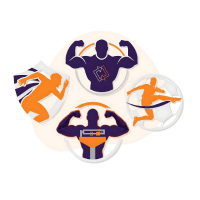
Alcohol and athletic performance is a big topic when it comes to sports. It’s been shown to make up to 5% of an athlete’s calorie intake. Why is this concerning? It’s been shown to make up to 5% of an athlete’s calorie intake. Why is this concerning? Calorie intake is important for an athlete, making sure the calories they consume are helping the body, not hindering it. Alcohol consumption in any volume can interfere with performance, recovery, muscle building and maintenance, and hydration. It can also impact body weight, hormone behavior, and vitamin function. Let’s explore each category a little more and see how it all comes into play.
Listen to the DEEP DIVE
- Alcohol-s Impact on Athletic Performance.wav00:00
Performance
The ability to perform is important when you’re an athlete. If you want to become the best at something, you need to perform your best. So why take the risk of worsening your skill? Alcohol during exercise has shown to limit oxygen intake, weaken body temperature regulation, and increase the risk of depression. When you can’t get enough oxygen, it will affect your body temperature, make you feel down, and you won’t perform the same. Alcohol reduces your brain’s ability to get excited and decreases your strength during performance. It impairs balance, reaction time, fine motor skills, and even your memory, which can greatly increase your risk of injury.
Hydration
Alcohol can also increase your risk of dehydration. Hydration is important before, during, and after performance. Alcohol works as a diuretic, meaning it will cause more frequent trips to the bathroom, which increases dehydration risk. It also works as a vasodilator which increases fluid loss even more. The more dehydrated you are, the less likely you are to perform well. While hydration is essential before and during activity, it’s especially important when you’re done exercising. If you check your weight before and after a training session, have 2 cups of water for every pound you lose to replace your fluid losses. The study below by Yoshida et al (2002) demonstrates the effects of dehydration and loss of body weight on physical performance.
Recovery and Muscle Growth
When you’re in recovery from a workout, alcohol can cause muscle cramps, pain, and hypoglycemia. Hypoglycemia (low blood sugar) can occur when the cells have taken up and absorbed most of the glucose due to the increased insulin secretion caused by alcohol consumption. Glucose is your body’s preferred source of energy. Insulin is needed for glucose uptake, and is made in the liver. Alcohol impairs liver function, causing high levels of insulin, and low levels of glucose; thus making blood sugar levels drop. This can cause dizziness, fainting, or even seizures. Having sufficient glucose available also allows your muscles to recover and promote growth after a workout. In order to continue to perform, your body needs sufficient recovery time. By consuming carbohydrate and protein immediately after a training session, glucose facilitates protein uptake into the muscle increasing protein synthesis which allows the muscle to recover and repair faster.
Growth hormone also plays a huge role in recovery. This is an important hormone that stimulates cell, bone growth and development. Growth hormone is secreted within the first few hours during sleep, but if you’re not sleeping well or not getting enough sleep, this process is disrupted. Alcohol often disrupts sleep cycles, thus affecting growth hormone and therefore, cell development and overall performance.
Hormone Production
Speaking of hormones, testosterone and estrogen are negatively affected by the consumption of alcohol and could cause a decline in hormone production. Hormones in general act as messengers that regulate and manage the function of all tissues and organs. Why is this significant? Optimizing growth hormone and testosterone levels, especially when training, is critical for peak performance, making adequate rest and minimal alcohol consumption an integral part of an athlete's plan. Both estrogen and testosterone play a role in bone growth and vitamin absorption. Testosterone promotes muscle growth, which is why men are able to grow more muscle than women. Estrogen promotes breast development, body hair growth, and menstrual cycle initiation. It’s crucial that these hormones be in balance during body growth, especially for an athlete, in order for body processes to continue to function normally. Testosterone levels in men have been shown to dramatically drop after just 5 days of consuming alcohol regularly.
Vitamin and Mineral Function
Calcium (Ca) and vitamin D absorption are also affected in the consumption of alcohol. Vitamin D goes hand in hand with Ca. Ca is stored in your bones and teeth, and any other calcium flows through your blood and works as a communicator with cells. The absorption and excretion of Ca is directly affected by hormones and their function. As we now know, alcohol has a negative impact on certain hormones and this can result in a loss of Ca from the body. The less calcium you have, the weaker your bones will be. Also with heavy drinking, vitamin D absorption is interrupted, thus affecting the absorption of Ca even more. A lack in either vitamin D or Ca can lead to Osteoporosis, Liver disease, and increased risk of fractures which could jeopardize your career as an athlete. Your bones need to be strong and healthy in order to perform.
When you drink alcohol, it is metabolized by the liver using niacin and other B vitamins. This could potentially lead to a lack in availability of these vitamins for essential body functions. Excessive alcohol intake over time could even lead to anemia characterized by fatigue and muscle weakness.
Body Weight
All of the previous facts involve the inside functioning of the body; you can’t physically see it. Not only will alcohol affect you internally, but it can greatly impact your external appearance as well in the form of weight gain. There are 7 kilocalories (kcals) per gram in alcohol. This means that for every gram of alcohol you consume, 7 calories come with it. A standard drink contains 0.6oz of pure alcohol, that’s 14 grams!
So say you have 3 beers while you’re out to dinner, that’s almost 450 extra calories just from drinks, let alone your meal. Anywhere from 7-14 drinks per week can tack on an easy 600-1800 extra calories which can lead to a long-term weight gain. As an athlete, you need to be in the best shape you can be, drinking won’t help this.
In addition to the calories, the after-effects of alcohol can greatly impact your performance. When your body is hungover, you may crave more grease, fried food, and carbs the whole day. A workout is also something that’s last on your mind, and might make your head hurt more. So not only will drinking affect you in the immediate phase, it will continue to linger and provide an atmosphere for poor eating habits as well as an attitude against working out. Did you get the munchies during a night out? Crave that dollar slice of pizza on the way home from the bar? This is another reason alcohol can negatively impact your weight. When you’re under the influence of alcohol, your inhibitions are lowered and you’re more likely to eat foods you wouldn’t normally.
Alcohol doesn’t seem to have any nutritional benefit when it comes to performance. If you want to feel your best and perform your best, staying away from alcohol is encouraged. Being an athlete means you need to treat your body like the temple that it is. Alcohol will only cause dehydration, dizziness, muscle and bone weakness, and weight gain. So next time you’re out with friends or encouraged to have a drink before a game, think twice. It’s certainly ok to enjoy socially (1-3 drinks per week), but when it comes to performance, it only hinders the athlete.

Eat 2 Win Nutrition App
Fuel the Champion Within

Trackers
Stay on target with cutting-edge trackers that monitor every step of your journey, ensuring you never miss a beat.

Meal Plan Guides
Simplify your nutrition with easy-to-follow, personalized meal plans that fuel your performance.

Gamification
Stay motivated and engaged by earning rewards and climbing leaderboards as you hit your fitness and nutrition goals.

Access a Sports Dietitian
Get expert guidance and personalized support from a certified Sports Dietitian whenever you need it.

Personalized Programs
Unlock your full potential with personalized programs meticulously crafted to match your unique lifestyle and fitness aspirations.



